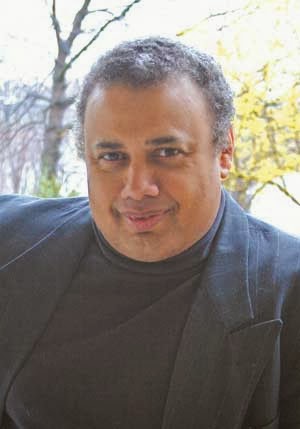 |
| Composer Kevin Scott |
Composer Kevin Scott’s
A Point Served...(In Remembrance Arthur Ashe) was written in the
commemoration of the sporting legend and civil rights champion Arthur Ashe. The
composition will be read at the Detroit Symphony EarShot Classical Roots Readings on March 9 at Orchestra Hall in Detroit, MI. Find out from this
interview with Kevin, how A Point Served…
was in part a response to Debussy’s Jeux and
what he hopes he will get out the experience of taking part in the Readings.
American Composers Orchestra: What was the inspiration for your composition? How have you
taken this inspiration and incorporated it into your work that will be read at
the Detroit Symphony EarShot Classical Roots Readings?
Kevin Scott: When I heard about
Arthur Ashe's passing, I felt that a chapter in both sports and African-American
history had lost a great person who was a figurehead in his profession,
and a true role model for generations to come, and a few days after his death I
decided to compose a work in his memory.
Ashe's inspiration as a champion of civil rights, as well as one of the best in the field of tennis, compelled me to combine the two aspects of his life. I wanted to musically capture the tennis game in an abstract way, and in doing this I decided to feature mallet percussion, harp and piano imitating the repartee between players, hitting the ball across the net, complete with footsteps, stumbles and a few inaudible breaths and mutterings, while at the same time there is a theme that begins in the strings that spells his name, employing a variation of soggetto cavato (carved-out subject), which I use in several of my compositions to either depict a person or a subject. This theme is subject to transfiguration and minute variation through the use of post-serial techniques, though not used in a strict way.
Ashe's inspiration as a champion of civil rights, as well as one of the best in the field of tennis, compelled me to combine the two aspects of his life. I wanted to musically capture the tennis game in an abstract way, and in doing this I decided to feature mallet percussion, harp and piano imitating the repartee between players, hitting the ball across the net, complete with footsteps, stumbles and a few inaudible breaths and mutterings, while at the same time there is a theme that begins in the strings that spells his name, employing a variation of soggetto cavato (carved-out subject), which I use in several of my compositions to either depict a person or a subject. This theme is subject to transfiguration and minute variation through the use of post-serial techniques, though not used in a strict way.
ACO: Since you have
been chosen to participate in these Readings, have you furthered developed your
composition? How have you been preparing yourself and your work for the
Readings?
KS: This will be its first
performance with a live orchestra, so I consider it a finished composition, but
that does not mean that it may be subject to revision after I hear it. I may
like what I hear, or I may find myself re-orchestrating passages in the
composition.
Preparing myself is a challenge. The best way to prepare one's self for something like this is not to worry about it until you get there, and then take the situation as it comes. You don't want to build false hopes or anxieties for yourself.
Preparing myself is a challenge. The best way to prepare one's self for something like this is not to worry about it until you get there, and then take the situation as it comes. You don't want to build false hopes or anxieties for yourself.
ACO: During the
readings your work will be workshopped with the help and guidance of Detroit
Symphony music director Leonard Slatkin, mentor composers, and DSO
musicians. What do you hope to get out of this experience?
KS: One hopes that they
will look at the composition at face value and offer their suggestions with no
prejudice. Composers always learn from each other, and also to hear
the feedback from Leonard Slatkin will be an added plus, as he will have seen
my music, or that of my colleagues, for the first time and will have an open
ear and eye about what he's encountering.
ACO: Your composition will be read live to the public during the
Readings. Is there anything about the piece that you would like the audience to
know about before hearing it?
KS: This is one of three
works that make up my unofficial African-American trilogy for orchestra, the
other two works musically portraying Betty Shabazz (Malcolm X's widow) and
Thurgood Marshall, though all three works should be played separately. In many
ways, A point served... is
my response to Debussy's Jeux,
which also depicts a tennis game, albeit with a more intimate and personal
scenario than mine, but at the same time my composition is also the most
abstract of my orchestral works, a fantasia uninhibited by classical form or
structure of any sort.
ACO: You will
also taking part in the professional development workshops during the Readings.
Is there anything specific that you hope you will learn from attending these
workshops?
KS: Again, one can learn
from each other, and rather than dwell on what to expect, I'm just going in
with an open eye and ear and learn what is and isn't, what should be done and
what shouldn't be done, and as we continue to find new techniques, styles and
presentations, learn to adapt them into one's own perspective of music and take
it from there.





